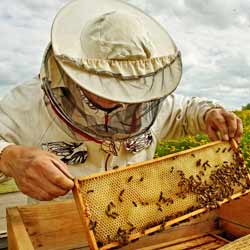Beekeeper Jobs
Do you like bees? What do you do if a bee comes near you? Do you swat it away or do you manage to stay calm and avoid its plunging stinger? Bees can be an annoying nuisance, but bees can also be a lucrative insect if you’re a beekeeper.
Beekeepers actively work with bees. They maintain beehives to harvest their sweet delicious honey and to help pollinate plants, which increases both fruit and veggie production. There are nearly 200,000 beekeepers, also called apiarists, in the United States.

Most beekeepers start this hobby because they love honey. Some do it as a hobby, others as a small business, and some as a career.
Every beekeeper needs protective clothing, smokers, hives, and bees. Protective clothing is an absolute necessity, as a swarm of stinging bees can be dangerous. A smoker helps calm the bees. A two-story hive with Honey Supers to collect the honey is used by most beekeepers. Of course, every beekeeper must have bees. It’s good to start with 3 pounds of bees and a healthy queen bee.
A hive works where a queen bee lays eggs to produce drones and workers. The drones and workers go out and pollinate flowers, then come back and produce sweet honey in the combs of the Honey Supers in the hive. Once or twice a year, the beekeeper harvests the honey. Every honey has a unique color, taste, and aroma. It depends on the type of flower the bee has visited – alfalfa, clover, wildflower, raspberry, or any other flower.
One hive has around 50,000 bees and one queen bee, all actively working to produce about 100 to 200 pounds of honey. Beekeepers make their money on the sale of the honey. The more hives, the more money. It takes hundreds of hives to run a small business and big commercial locations have tens of thousands of hives.
Beekeepers make the most money from honey. But other bee products like bee pollen, propolis, royal jelly, and beeswax are profitable too. Some beekeepers raise bees to sell to up and coming beekeepers. Other beekeepers are happy with free honey and the entertainment of watching swarms of bees.
Bees pollinate flowers in the spring and summer then they eat their honey to stay alive in winter. After beekeepers extract the honey from the combs, they have to prepare the hives for winter. Maintaining the hives is very important because the bees must stay healthy if they are to produce honey.
Beekeepers are busiest during the heat of the summer. They often work solo and can plan to get their fingers sticky.
Beekeeping isn’t something that can be learned overnight. It takes time. A good place to learn this art is from other beekeepers, reading beekeeping magazines, or by joining a beekeeping association like the American Honey Producers Association or the American Beekeeping Federation.
Beekeepers often have a college education in entomology or botany, but no formal education is required. What is important is understanding a bee’s life cycle, honey production and harvest, and safety. In order to ensure that beekeepers follow safety rules, many states require that beekeepers obtain a state issued license. Once licensed, beekeepers can plan to make $20,000 to $50,000 per year. It all depends on the number of hives they maintain.
If you are ready to hear that familiar honeybee buzz and eat all the honey you could ever want then consider beekeeping. Maybe your honey hobby will turn into a blossoming business. But no matter what, everyone can agree that this hobby job is sweet.
Quick Facts About Beekeeping
Job Title: Beekeeper or Honey Farmer
Office: Surrounded by bee hives
Description: Maintain hives and bees. Harvest honey from beehives
Certifications/Education: No formal education required, Possibly a state issued license
Necessary Skills: Knowledge of bee safety, equipment, and harvesting techniques
Potential Employers: Self-Employed
Pay: $20,000 to $50,000 per year, based on number of active hives
Helpful Beekeeper Employment Links:
Search Beekeeper Jobs on JobMonkey
American Beekeeping Federation
National Honey Board
American Apitherapy Society
American Honey Producers Association
Bee Culture Magazine
Beekeeping Wikia

